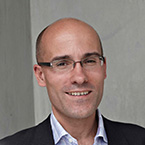
For his innovative research focused on identifying molecular mechanisms of cancer evolution and its impact on drug resistance and patient stratification and for demonstrating the crucial biological connection between intratumor heterogeneity and clinical cancer biomarker efficacy.
An internationally heralded scientist, Dr. Swanton’s innovative research has focused on the identification of cancer evolution mechanisms and their impact on drug resistance and patient stratification. Using novel experimental approaches that employ parallel clinical trial studies coupled with integrative functional genomics, his group has demonstrated important connections between intratumor heterogeneity and the success of clinical cancer biomarkers. As a graduate student, Dr. Swanton identified that herpes virus cyclins bound to Cdk6 evade inhibition by CDK inhibitors, leading to constitutive cell cycle progression. This work provided a mechanism by which viruses may induce uncontrolled cell growth and malignancy in humans. His subsequent work focused on identifying gene signatures that contribute to treatment resistance and ultimately highlighted the high prevalence of chromosomal instability in treatment-resistant cells.
Dr. Swanton’s studies involving chromosomal instability and aneuploidy led him to make several seminal findings involving tumor heterogeneity and cancer evolution. In a series of elegant experiments, Dr. Swanton and colleagues analyzed samples from primary renal carcinoma patients, including original and metastatic sites, biopsied at distinct time points during treatment. This analysis provided a window into the evolving genetic landscape of the tumor. He coined the founding mutations in the original tumor site as “trunk” mutations and subsequent genetic alterations as “branches”, identifying distinct cell lineages responsible for tumor growth versus metastasis. More recently, Dr. Swanton’s research group has explored the impact of tumor heterogeneity on immune responses. His research team uncovered that the presence of neoantigens in a high percentage of tumor cells leads to a more robust response to immune checkpoint inhibitor treatments. Together with his team, Dr. Swanton also identified the loss of human leukocyte antigen (HLA) in approximately 40% of tumor cells, which allows for these to evade immune recognition. Together, these studies have enabled critical advances in precision medicine by contributing to the development of new predictive tools able to efficiently and effectively define optimal therapeutic strategies for stratified patient populations.
Selected Awards and Honors
2021 Memorial Sloan Kettering Cancer Centre Paul Marks Prize for Cancer Research
2020 Bonnie J. Addario Lectureship Award, Annual International Lung Cancer Congress, GO2 Foundation for Lung Cancer, Washington, DC
2019 ESMO Translation Research Award, European Society for Medical Oncology, Lugano, Switzerland
2018 Paul A. Bunn Jr. Scientific Award, International Association for the Study of Lung Cancer, Denver, Colorado
2018 Gordon Hamilton Fairley Medal and Lecture, European Society for Medical Oncology, Lugano, Switzerland
2018 Jonathan Kraft Prize for Excellence in Cancer Research, Massachusetts General Hospital Cancer Center, Boston, Massachusetts
2017 Translational Cancer Research Prize, Cancer Research UK, Oxford, United Kingdom
2017 Ellison-Cliffe Medal and Lecture, Royal Society of Medicine, London, United Kingdom
2017 Fondazione San Salvatore Award, Fondazione San Salvatore for Cancer Research, Lugano, Switzerland
2016-2026 Royal Society Napier Research Professorship, The Royal Society, London, United Kingdom
2015 Laura Ziskin Translational Cancer Research Prize, Stand Up to Cancer (SU2C), Los Angeles, California
2013 Graham Bull prize in Clinical Science, Royal College of Physicians, London, United Kingdom
2012 PCF Challenge Award, Prostate Cancer Foundation, Santa Monica, California